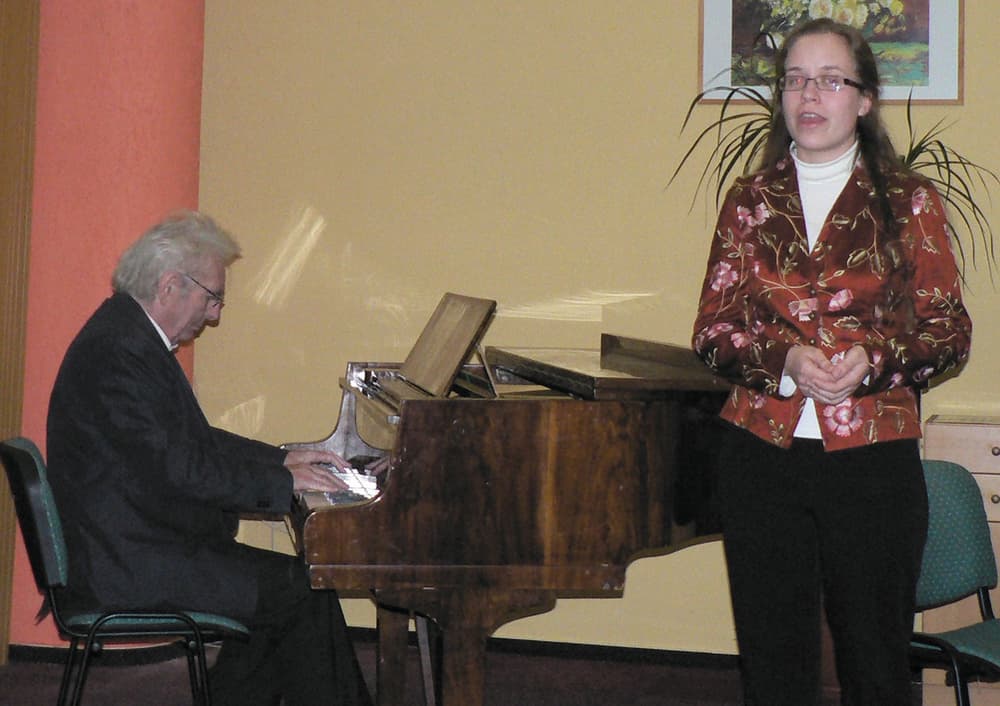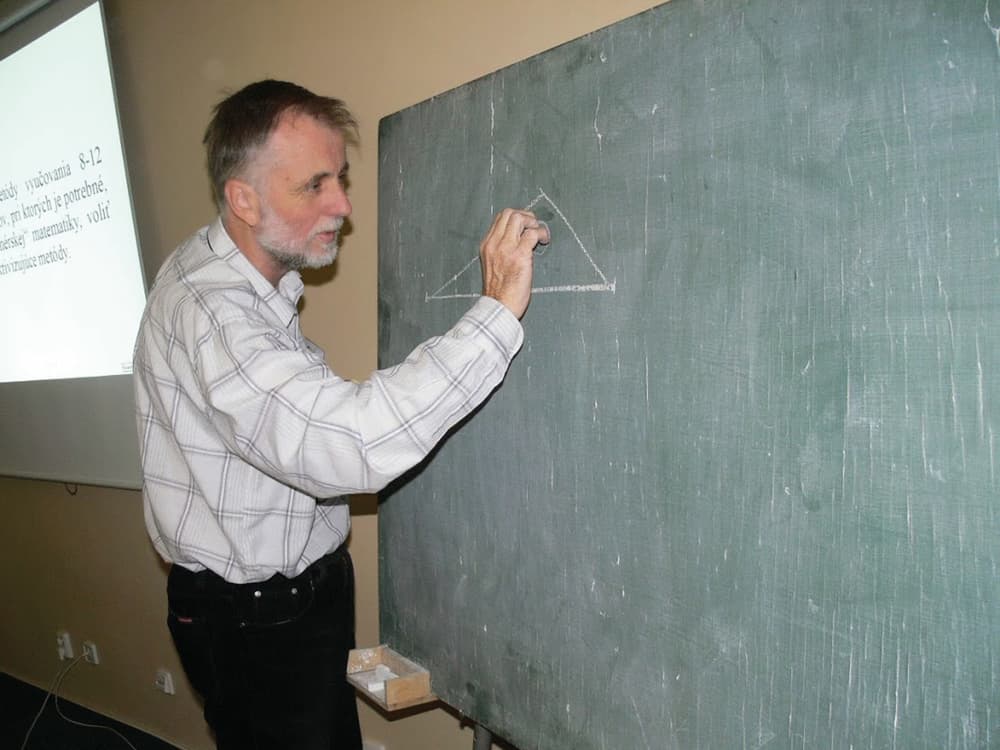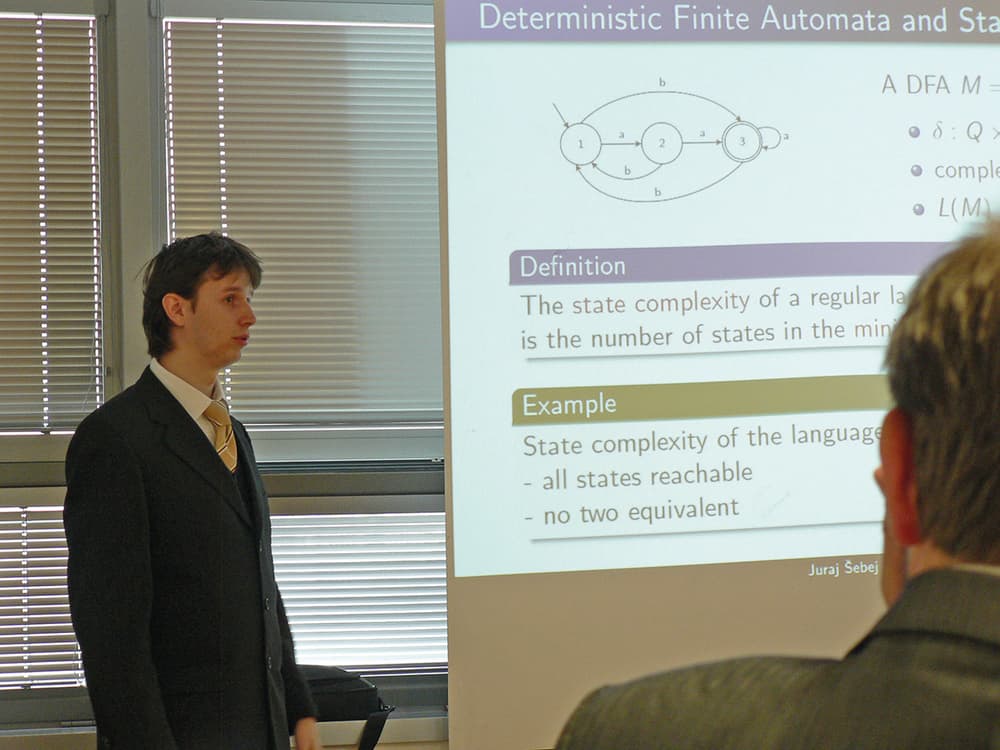Our roots
The Slovak Mathematical Society was officially founded on January 1, 1969, as the mathematical branch of the Union of Slovak Mathematicians and Physicists. However, the real root of the organisation of scientific life of Slovak mathematicians lies in the Union of Czechoslovak Mathematicians and Physicists, or, more precisely, in the Union of Czech Mathematicians which was renamed Union of Czechoslovak Mathematicians and Physicists in 1921. The year 1929 saw the beginning of the first regular seminar for mathematics and physics, at the Faculty of Medicine of the Comenius University in Bratislava. The year 1951 was also important, marking the decision to create the Slovak Committee of the Union of Czechoslovak Mathematicians and Physicists. The Mathematical Olympiad has been organized in Slovakia since that time.
Prof. Riečan with his PhD student during the concert of participants in 2010
🅭🅯 CC BY 4.0František Kosper, high school teacher, the winner of the Bartoš Prize in 2013, giving his talk
🅭🅯 CC BY 4.0Juraj Šebej, one of the participants in the Student Conference in Mathematics and Informatics in 2012
🅭🅯 CC BY 4.0What we do
Among Slovak mathematicians there are research groups dealing with
discrete mathematics: graph theory, combinatorics, …;
algebra: semigroups, set theory, quantum structures (i.e., ortho-modular lattices and Hilbert spaces as the most important representatives of orthomodular lattices);
theory of chaos;
mathematical and functional analysis;
numerical analysis;
applications of PDE in engineering and in some other areas (e.g., medicine);
probability and statistics;
uncertainty modelling: time series, fuzzy logic, aggregation of information, generalised measure theory (capacities, i.e., monotone set-functions) and integrals with respect to capacities.
Mathematics and music
The SMS organizes various series of regular seminars, each of them devoted to a different field of mathematics, corresponding to the research groups listed in the previous section. Among these, the seminar on “Mathematics and Music” is particularly worth mentioning. In this seminar, which originated in the 1970s and lasted, with some breaks, till the 1990s, mathematicians whose hobby was music met with musicians – professional composers and interpreters. One of the main organisers of the seminar was late Professor Riečan (1936–2018). Music was his great passion. Whenever he organised a mathematical conference, there would be one evening session devoted to a concert by the participants. The first of the three photos shows Professor Riečan performing with a Ph.D. student during one of these concerts.
Annual conference of Slovak mathematicians
Another event that I would like to mention is the annual conference of Slovak mathematicians. This is a conference where university staff members and academicians meet teachers. In other words, it is not a high-level scientific conference where the participants present their latest results; rather, there are overview talks on a level that is understandable even for primary school teachers. There is a competition of young mathematicians (under 30 years of age) who compete by submitting series of papers. The winner is awarded the Academician Schwarz Prize (named for Štefan Schwarz 1914–1996, whose main area of interest was the theory of semi-groups). Apart from this, there is also the Peter Pavol Bartoš Prize for teachers and university staff dealing with didactics of mathematics. The prize is awarded for a nice textbook or for long-lasting excellent results in teaching mathematics (Peter Pavol Bartoš 1901–1975 was a high school teacher known for his textbooks and the problems he set for the Mathematical Olympiad).
Czech-Slovak student conferences
A long-standing tradition was the organisation of student scientific conferences in Czecho-slovakia as competitions. Nowadays, we still have such a conference-competition, organized in cooperation with the Czech Mathematical Society in mathematics and informatics, and another one in didactics of mathematics organized in cooperation with SUMA (Society of Teachers of Mathematics of the Czech Republic). These events have a three years period – they always take place twice at universities in the Czech Republic and once in Slovakia. Only in 2020, due to the coronavirus pandemic, the conference in didactics of mathematics was taken online and the conference in mathematics and informatics was cancelled altogether.
Some other scientific events
Cooperation with mathematical societies of other European countries is pursued thanks to the organisation of several conference series. Let us name a few.
Equadiff is a series of biannual conferences. Its scope is mathematical analysis, numerical mathematics and applications of differential equations. The history of this series is quite long. It rotates between the Czech Republic, Slovakia, and Western Europe. It has already taken place 14 times in the Czech Republic and Slovakia. In 2017, Equadiff was hosted by the SMS.
In cooperation with the Czech, Slovenian, Austrian and Catalan Mathematical Societies, a series of CSASC conferences was organized. In 2018, CSASC was hosted by the SMS. The CSASC conference consists of several mini-symposia. The 1 CSASC was held in Krems, Austria, in 2011.
EUROCOMB is the European Conference on Combinatorics, Graph Theory and Applications. The 1 EUROCOMB was held in Barcelona, Spain in 2001. In 2019, this conference was hosted by the SMS.
Cite this article
Martin Kalina, Slovak Mathematical Society – a short overview of history and present. Eur. Math. Soc. Mag. 120 (2021), pp. 48–49
DOI 10.4171/MAG/30


